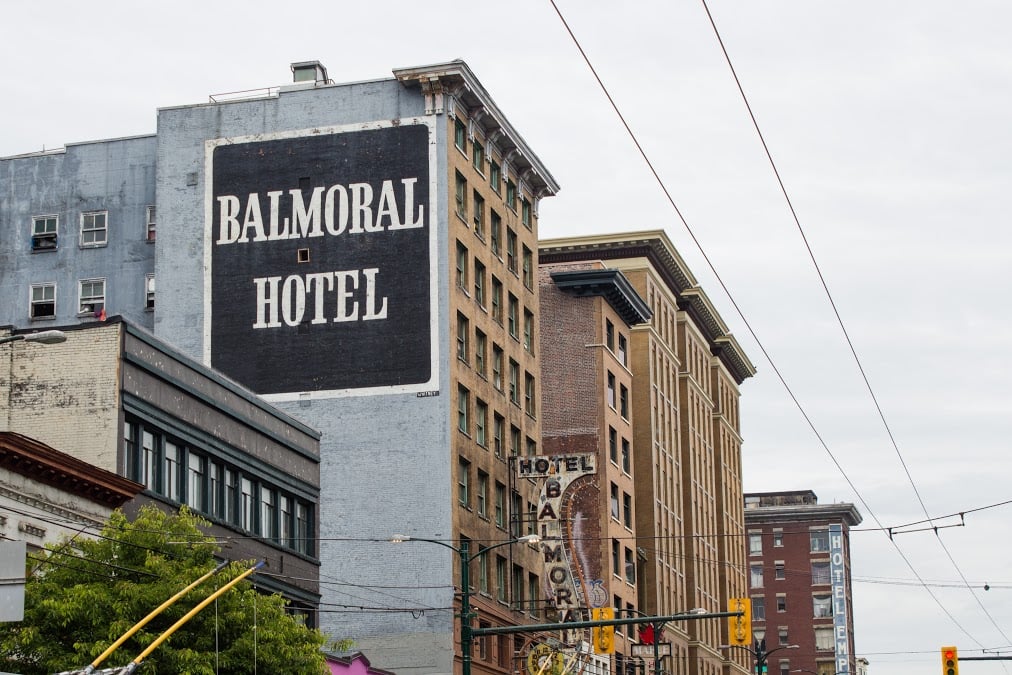Vancouver city council has voted unanimously to move forward with a $1-billion single-room occupancy hotel purchasing strategy, and to also explore stricter rent control and strengthen protections for tenants who live in the buildings.
Under the plan, the city will pursue $1 billion in funding from the provincial and federal governments to buy up to 105 SRO hotel buildings. Around 2,500 rooms in the buildings would be renovated or redeveloped into self-contained units with their own bathrooms.
The SRO plan is separate from a previous decision to spend $30 million to buy or lease hotels, apartment buildings and SRO buildings to address an uptick in homelessness in the city because of COVID-19 restrictions.
Wendy Pedersen, a housing activist who founded the SRO Collaborative, praised the plan as a “watershed moment for the Downtown Eastside.”
“Not since the early '70s has the city been so bold in its vision and so responsive to community,” she told council.
SRO hotels provide housing for around 5,000 low-income people in Vancouver. The hotels — many of them built over 100 years ago — feature tiny 100 to 320 square-foot rooms and shared bathrooms. Some also have shared kitchens.
Most of Vancouver’s SRO hotels are located in the Downtown Eastside, Strathcona and Chinatown, but some are also located in other parts of Vancouver’s downtown.
The worst buildings are in extreme disrepair, with problems like mould, infestations, broken fire suppression systems, no heat or hot water and frequent elevator breakdowns.
In 2017 and 2018, the city ordered the two worst SROs in the city — the Balmoral and the Regent — to close because the buildings were unsafe. For the first time, the city used its powers of expropriation to take control of the buildings from their owners, the Sahota family. The expropriation attempt is still before the courts.
Around half of the city’s SROs are now owned by non-profit organizations, the province or the city. But for the other half that remain in private hands, there’s ongoing pressure to sell to investors. Many of those investor owners have done “minor renovations” to many of the buildings and now charge rents far above what most people living in poverty can afford.
That’s creating a “ripple effect” of increased homelessness and encampments, city staff told council.
There are now only 77 private rooms that charge the social assistance “shelter rate” of $375, while most rooms are rented at an average of $560. Renovated rooms are being rented to students or service industry workers at rents that range from $700 to $1,600.
Erica Grant lives in an SRO operated by a non-profit housing provider. It’s not a dignified way to live, Grant told city councillors, and it’s impossible to follow COVID-19 guidelines with shared bathrooms and shared kitchens.
“I honestly do not want to live my last days in an SRO,” Grant said. “None of us need to be living this way.”
City staff will also be looking into what tools the city can use to prevent rents from rising when a tenant moves out and a new person moves in and reporting back to council. City staff can now compel SRO owners to give them information about how much rent they charge.
The new plan also strengthens tenant protections: tenants who have to move out because of redevelopment or building closure will get compensation based on length of tenancy, and $750 for moving expenses.
Council will also be able to charge building owners who are applying for building permits $230,000 “to fund the costs of replacing a room that is being removed” from the SRO stock. ![]()
Read more: Rights + Justice, Housing, Municipal Politics
















Tyee Commenting Guidelines
Comments that violate guidelines risk being deleted, and violations may result in a temporary or permanent user ban. Maintain the spirit of good conversation to stay in the discussion.
*Please note The Tyee is not a forum for spreading misinformation about COVID-19, denying its existence or minimizing its risk to public health.
Do:
Do not: